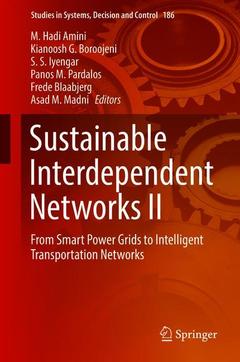Description
Sustainable Interdependent Networks II, 1st ed. 2019
From Smart Power Grids to Intelligent Transportation Networks
Studies in Systems, Decision and Control Series, Vol. 186
Language: English
Subjects for Sustainable Interdependent Networks II:
304 p. · 15.5x23.5 cm · Hardback
Description
/li>Contents
/li>Biography
/li>Comment
/li>
This book paves the way for researchers working on the sustainable interdependent networks spread over the fields of computer science, electrical engineering, and smart infrastructures. It provides the readers with a comprehensive insight to understand an in-depth big picture of smart cities as a thorough example of interdependent large-scale networks in both theory and application aspects. The contributors specify the importance and position of the interdependent networks in the context of developing the sustainable smart cities and provide a comprehensive investigation of recently developed optimization methods for large-scale networks.
There has been an emerging concern regarding the optimal operation of power and transportation networks. In the second volume of Sustainable Interdependent Networks book, we focus on the interdependencies of these two networks, optimization methods to deal with the computational complexity of them, and their role in future smart cities. We further investigate other networks, such as communication networks, that indirectly affect the operation of power and transportation networks. Our reliance on these networks as global platforms for sustainable development has led to the need for developing novel means to deal with arising issues. The considerable scale of such networks, due to the large number of buses in smart power grids and the increasing number of electric vehicles in transportation networks, brings a large variety of computational complexity and optimization challenges. Although the independent optimization of these networks lead to locally optimum operation points, there is an exigent need to move towards obtaining the globally-optimum operation point of such networks while satisfying the constraints of each network properly.
The book is suitable for senior undergraduate students, graduate students interested in research in multidisciplinary areas related to future sustainable networks, and the researchers working in the related areas. It also covers the application of interdependent networks which makes it a perfect source of study for audience out of academia to obtain a general insight of interdependent networks.
M. Hadi Amini is currently a Ph.D. candidate in the Department of Electrical and Computer Engineering at Carnegie Mellon University, Pittsburgh, PA, where he received his M.Sc. in Electrical and Computer Engineering in 2015. Prior to that, he received his B.Sc. from the Sharif University of Technology, Tehran, Iran, in 2011, and his M.Sc. from Tarbiat Modares University, Tehran, in 2013, both in Electrical Engineering. He serves as reviewer for several high-impact journals, and international conferences and symposiums in the field of power systems. Hadi currently serves as the President of Carnegie Mellon University Energy Club. He serves on the technical program committee of “IEEE Int’l. Conf. on Smart Energy Systems and Technologies” (SEST 2019). He has published more than 50 refereed journal and conference papers in the smart energy systems and electrified transportation network-related areas. He serves as the lead editor for Sustainable Interdependent Networks. He is the recipient of the best paper award of Journal of Modern Power Systems and Clean Energy in 2016, best reviewer award of IEEE Transactions on Smart Grid from the IEEE Power & Energy Society in 2017, outstanding reviewer award of IEEE Transactions on Sustainable Energy in 2017, and the dean’s honorary award from the president of Sharif University of Technology in 2007. Hadi is a member of IEEE-Eta Kappa Nu (IEEE-HKN) Sigma Chapter, the honor society of IEEE. He ranked 26th among about 270,000 participants in the Iranian Nationwide University Entrance Exam for B.Sc. degree in 2007. His current research interests include interdependent networks, distributed/decentralized optimization algorithms in energy systems, transportation electrification, smart grid, and cybersecurity of power systems.
Kianoosh G. Boroojeni received his Ph.D. in Computer Science. He received his B.Sc. from the University of Tehran in 2012 and his M.Sc. from Florida International University in 2016.
Provides a thorough theoretical vision towards dealing with the issues by emerging interdependencies among future networks;
Develops efficient techniques for network of network to move from locally-optimum operation towards obtaining the globally-optimum operation;
Focuses on interdependencies among smart power grids and intelligent transportation networks, optimization methods to deal with the computational complexity of them, and their role in future smart cities.




